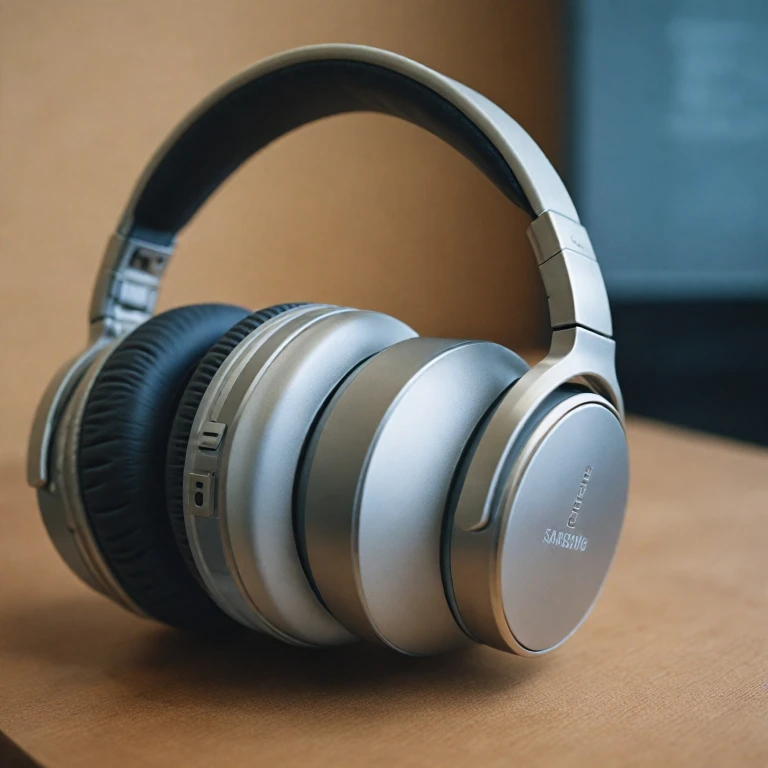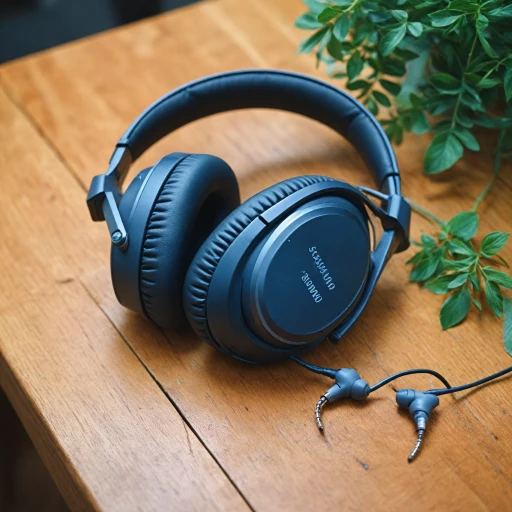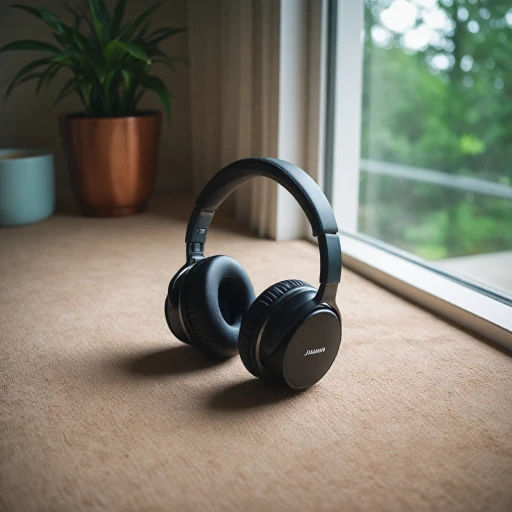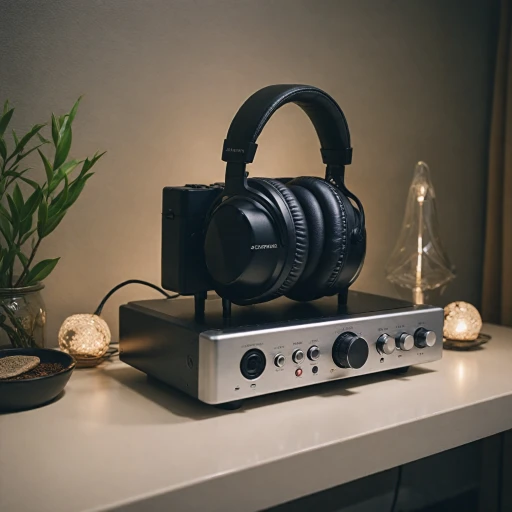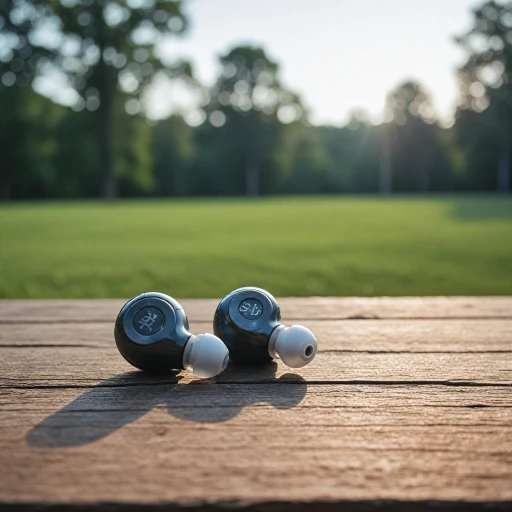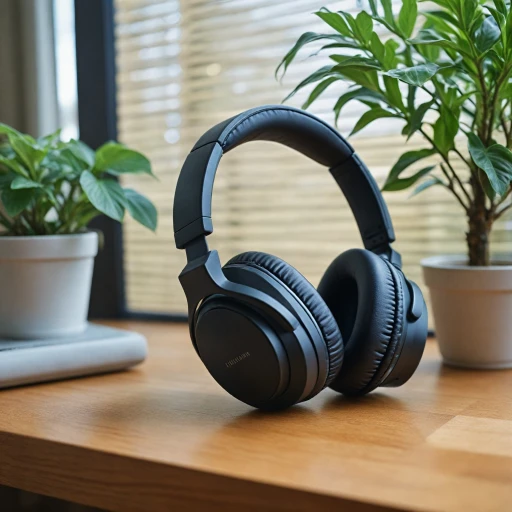The Basics of Noise Canceling Technology
Understanding Noise Canceling Technology
Noise canceling technology has become a pivotal feature in modern headphones, especially for those who seek an immersive audio experience. At its core, noise canceling works by reducing unwanted ambient sounds, allowing you to focus on the music or audio you're listening to. This technology can be particularly beneficial in environments with constant background noise, like airplanes or busy offices.
There are two main types of noise canceling: passive and active. Passive noise canceling, often referred to as noise isolation, relies on the physical design of the headphones. This includes the materials used in the ear cups and the overall build quality. The beyerdynamic DT 770 headphones, for example, are closed headphones that provide excellent passive noise isolation due to their closed-back design and snug fit around the ears.
Active noise canceling, on the other hand, uses electronic circuitry to counteract ambient noise. This involves microphones that pick up external sounds and generate sound waves that are the exact opposite, effectively canceling out the noise. While the beyerdynamic DT 770 is renowned for its passive noise canceling capabilities, exploring other options with active noise canceling might be beneficial if you frequently find yourself in particularly noisy environments.
For those interested in a deeper dive into earphones with noise cancellation, understanding the distinctions between passive and active technologies can help you make an informed decision based on your specific needs and preferences.
Beyerdynamic DT 770 Features and Specifications
Exploring the Features of the beyerdynamic DT 770
When it comes to pro headphones, the beyerdynamic DT 770 stands out as a top contender in the realm of closed studio headphones. Known for its exceptional sound quality and robust build quality, this model has become a staple in studio mixing environments. Let's dive into what makes the DT 770 a popular choice among audio professionals and enthusiasts alike.
Specifications That Matter
- Frequency Response: The DT 770 offers a wide frequency response range, ensuring that you catch every nuance in your audio.
- Impedance Options: Available in different ohm versions (32, 80, and 250 ohms), these headphones cater to various audio setups, from portable devices to professional studio equipment.
- Closed Design: As closed headphones, they provide excellent noise isolation, making them ideal for both studio and casual listening.
- Build Quality: With durable materials and a black finish, these headphones are built to last.
- Ear Cups: The soft, cushioned ear cups ensure comfort during extended listening sessions.
Key Features
The beyerdynamic DT 770 is praised for its bass response, which is both deep and controlled, a crucial factor for those involved in studio mixing. The cable is sturdy and designed to withstand the rigors of daily use, adding to the headphones' overall build quality.
For those interested in a detailed comparison, check out our exploration of the Bose QC 25, which offers insights into alternative noise-canceling technologies.
Pricing and Availability
The DT 770 is available in various editions, including a limited edition model. With competitive price points, they offer great value for those seeking high-quality studio headphones. Many retailers offer free shipping, making them even more accessible to audio enthusiasts worldwide.
In summary, the beyerdynamic DT 770 pro headphones are a solid choice for anyone looking to invest in reliable, high-quality closed studio headphones. Their versatile ohm options and superior sound performance make them a worthy addition to any ear studio setup.
Comparing Passive vs. Active Noise Canceling
Juxtaposing the Passive and Active Approaches to Noise Cancellation
When diving into the realm of noise canceling headphones, understanding the nuances between passive and active noise cancellation techniques is paramount. The distinction not only impacts the overall audio experience but also the price range and effectiveness of the headphones, such as the beyerdynamic DT 770. Passive Noise CancellationPassive noise cancellation relies on the physical design of the headphones to block external sounds. This approach leverages the use of tight, closed ear cups which are pivotal in minimizing ambient noise. The beyerdynamic DT 770, a highly acclaimed closed studio headphone, benefits from top-notch build quality and thick padding around the ear, contributing to excellent passive noise isolation.
With its robust design, the beyerdynamic pro edition provides a comfortable fit, reducing sound leakage and offering a snug fit over many pro headphones on the market. This characteristic is vital for studio mixing and achieving precise audio monitoring, enabling users to focus on pure sound without being distracted by outside noise. Active Noise Cancellation
Conversely, active noise cancellation (ANC) uses electronic processing to detect ambient sounds through on-board microphones. It then generates sound waves with inverted phases to cancel out these noises. While beyerdynamic does offer active noise canceling options, the DT 770 leans into passive noise isolation, making it a staple choice for those who prefer a simpler solution with fewer electronic components. While active noise cancellation is renowned for more effectively blocking out low-frequency sounds, it is important to factor in potential effects on audio fidelity. In some ANC headphones, the introduction of such technology may subtly alter bass and overall frequency response. Those prioritizing undisturbed audio, especially for studio-grade ohm headphones, often prefer passive methods due to their non-intrusive nature. For those interested in the technical evolution of noise canceling technology, especially in the context of connectivity transitions, exploring the transition from 3.5mm to USB-C in noise-canceling headphones provides illuminating insights. Ultimately, choosing between passive and active noise cancellation requires weighing personal preferences and intended use-cases, especially when considering pro audio environments versus casual listening sessions. The right choice will hinge on how much one values features such as true sound accuracy or convenience and environment adaptability.
User Experience and Comfort
User Experience: Comfort and Design
When investing in headphones, especially for critical tasks such as studio mixing, comfort is often as important as sound quality. The beyerdynamic DT 770 is renowned among audio professionals for its exceptional comfort during extended use. The closed-back design effectively isolates unwanted noise, allowing you to focus solely on your music or audio tasks.
The ear cups are designed with soft padding that feels gentle against the skin, minimizing any potential discomfort during long listening sessions. The adjustable headband ensures a secure fit without exerting excessive pressure, making the DT 770 a suitable choice for various head sizes.
In terms of build quality, the beyerdynamic DT 770 Pro does not disappoint. Constructed with robust materials, these headphones offer reliable durability, making them an excellent choice for professionals who need equipment that withstands daily wear and tear in the studio. The black edition adds a sleek, modern aesthetic while maintaining the functional aspects users expect from the brand Beyerdynamic.
Also noteworthy is the cable; while it's not detachable, the coiled design provides flexibility and reduces the risk of tangling, further enhancing ease of use in various settings. Users seeking limited edition models may find variations in design, but the core aspects of comfort and build quality remain consistent across the range.
Sound Quality: What to Expect
Expectations of Audio Performance
When it comes to sound quality, the beyerdynamic DT 770 Pro headphones have earned a notable reputation among audiophiles and professionals alike. Known for their exceptional build quality, these closed studio headphones deliver an impressive level of audio fidelity that caters to the discerning ears of studio mixers and everyday music enthusiasts. Listeners who choose the beyerdynamic DT 770 can expect a highly detailed frequency response across a wide range of sounds, thanks to their studio-grade components. These headphones come in varying ohm editions, such as the pro ohm, allowing users to choose the variant that best suits their audio source and sound environment. The 32-ohm edition is often preferred for mobile use, whereas the 80-ohm version is commonly used for studio mixing.Unparalleled Isolation
One of the standout features of the beyerdynamic DT 770 is its superior noise isolation, which is ideal for closed studio environments. This aspect significantly enhances the listening experience, allowing users to focus on the nuances and intricate details within their audio tracks without external disturbances.Rich Bass and Clarity
Although the DT 770s are known for delivering a balanced sound signature, their bass performance is particularly praiseworthy. The closed black ear cups ensure a punchy and tight bass response, while maintaining clarity in the mids and highs. This well-rounded audio profile makes these closed headphones suitable for a range of applications, from monitoring audio to enjoying music at home.Overall User Feedback
In various reviews, beyerdynamic DT 770 Pro headphones users frequently praise the pro headphones’ comfort and durability. The sturdy cable, combined with the closed design, ensures long-lasting use for intensive studio environments or pro audio sessions. Additionally, the affordability and free shipping options make these headphones accessible to a broader audience. For those still comparing options, the beyerdynamic brand offers more than just sound quality. They provide a comprehensive package that includes reliability and consistent performance. With such details considered, it's clear why the beyerdynamic DT 770 has become a standard choice for both professional and personal use.Is the beyerdynamic DT 770 Right for You?
Is the DT 770 the Ideal Choice for You?
When considering investing in quality headphones for your studio or personal audio experience, the beyerdynamic DT 770 Pro should be on your radar. Known for its superior build quality and pro-level performance, this headphone is a staple in many studio mixing environments due to its excellent noise isolation and closed design. The DT 770 Pro stands out with its three different ohm editions—32 ohm, 80 ohm, and 250 ohm—geared towards different usage scenarios. For a more portable solution, the 32-ohm version is suitable for mobile devices, while the 80-ohm version is popular for studio applications. The 250-ohm variant is perfect for studio mixing and reference tasks, ensuring a detailed audio experience when driven by a powerful amplifier. Why Choose beyerdynamic DT 770 Pro?- Sound Quality: Renowned for its clear audio reproduction, the DT 770 delivers a balanced sound profile. Expect rich bass with crisp mids and highs, making it suitable for a wide range of audio activities, from casual listening to professional studio work.
- Comfort and Build: The ear cups are designed for long listening sessions, with velour padding ensuring comfort, even after hours of use.
- Versatility: Whether you're in a studio setting or simply at home enjoying music, the different impedance options provide flexibility, catering to your specific audio requirements.
